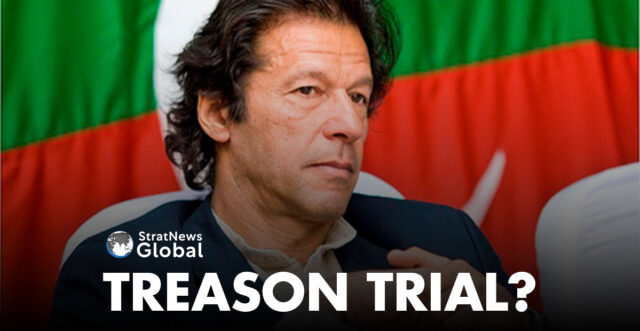Pakistan’s unprecedented arrest of a former spy chief raises the heat on Imran Khan and
could be the precursor to prosecuting the jailed former prime minister on charges of treason and attempting to incite a mutiny in the military, according to government officials and analysts.
Khan has been feuding with Pakistan’s all-powerful military after a falling out with then-army chief General Qamar Javed Bajwa in 2022, following which he was ousted from office in a parliamentary vote that he said was orchestrated by the generals.
The military has denied any involvement in his ouster. Khan has been public about the clash, which has led to the worst political turmoil in the South Asian nation in decades. The 71-year-old former cricket star has a devoted following, and any further military action against him could result in more unrest, analysts say.
Supporters of Khan went on the rampage on May 9 last year after he was briefly arrested, vandalising military installations across the country. It was the most serious challenge to the power of the military in Pakistan’s 75-year history.
Khan is on trial in a civil court for allegedly abetting the violence, a charge he has denied. But he can face more serious charges of treason and mutiny after last month’s arrest of
Lieutenant General Faiz Hameed, a Khan ally who is a former chief of the powerful Inter-Services Intelligence, officials and analysts said.
Treason and mutiny are tried by a military court, which is not open to the public, and the charges carry a maximum punishment of death.
“I think the arrest will be used to put pressure on Faiz Hameed to provide information that helps implicate Khan in the May 9 violence which the army chief sees as mutiny and an act of treason,” said author and defence analyst Ayesha Siddiqa, calling Hameed’s arrest a “political bombshell”.
Government officials have repeatedly said Hameed worked with Khan to plan the riots. Defence Minister Khawaja Asif told Geo TV last month that Khan provided the manpower while Hameed “masterminded the conspiracy”.
The military did not respond to a Reuters request for comment. Current army chief General Asim Munir said in May that there could be “no compromise or deal with the planners and architects of this dark chapter in our history”. He did not name
anybody.
With Reuters inputs
Thirty eight years in journalism, widely travelled, history buff with a preference for Old Monk Rum. Current interest/focus spans China, Technology and Trade. Recent reads: Steven Colls Directorate S and Alexander Frater's Chasing the Monsoon. Netflix/Prime video junkie. Loves animal videos on Facebook. Reluctant tweeter.





